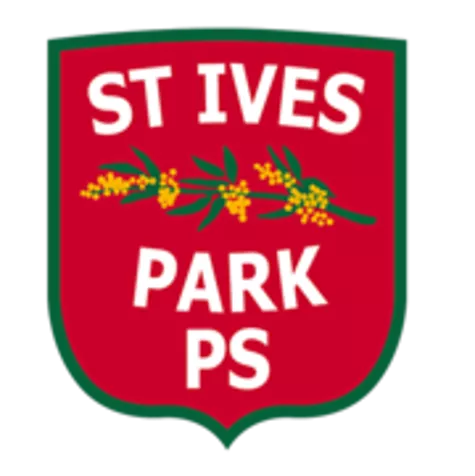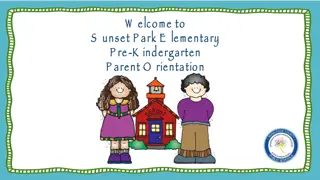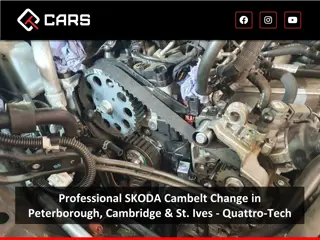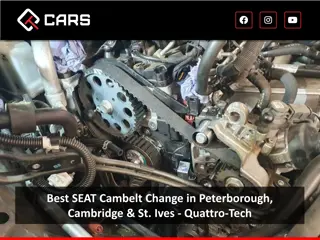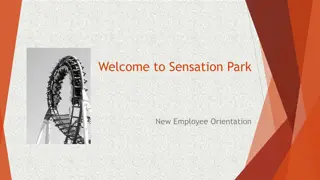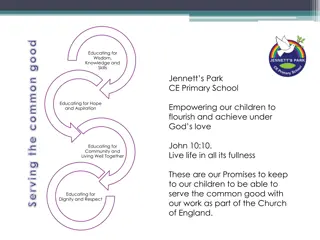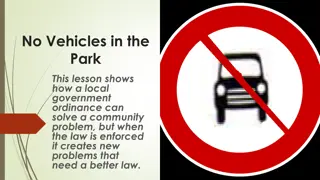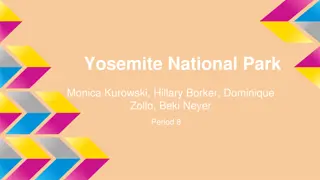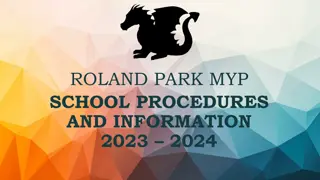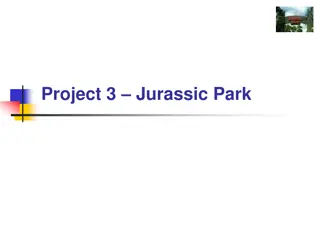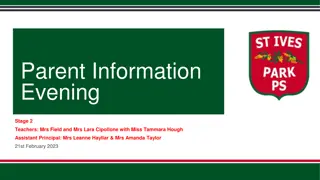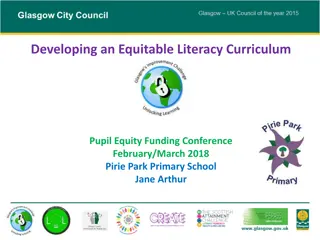St. Ives Park Public School Information Overview
St. Ives Park Public School offers a nurturing environment aiming to inspire successful lifelong learners. Their school improvement plan focuses on student growth and attainment, quality teaching practices, and student well-being. They follow the NSW Syllabus and uphold a behavior code for positive learning. Students are rewarded for good behavior and academic achievements. Parents can access relevant information through various resources provided by the school.
Download Presentation

Please find below an Image/Link to download the presentation.
The content on the website is provided AS IS for your information and personal use only. It may not be sold, licensed, or shared on other websites without obtaining consent from the author.If you encounter any issues during the download, it is possible that the publisher has removed the file from their server.
You are allowed to download the files provided on this website for personal or commercial use, subject to the condition that they are used lawfully. All files are the property of their respective owners.
The content on the website is provided AS IS for your information and personal use only. It may not be sold, licensed, or shared on other websites without obtaining consent from the author.
E N D
Presentation Transcript
Parent Information Evening Stage 1 Teachers: Miss Jamie Tippett and Miss Jenny Goodwin Assistant Principal: Mrs Alison Wright 21 February 2023
OUR VISION To inspire and nurture successful lifelong learners. OUR MISSION in the School Plan To ensure that educational programs at St Ives Park Public School guide students to develop into: o Successful lifelong learners o Balanced students, focussed on academic and social-emotional growth o Students who strive to achieve their personal best, accept and seek challenges in their learning .
School Improvement Plan 2021 - 2024 All NSW Public Schools have School Improvement Plans in place to guide their planning and student learning each year. The first strategic direction across the state is Student Growth and Attainment as set by the Department of Education. Our Strategic Directions at St Ives Park Public school include: Direction 1 Student growth and attainment improving learning to meet DoE targets. Direction 2 Quality practice and curriculum delivery to improve student learning improving teaching and learning. Direction 3 Connection and wellbeing supporting student wellbeing and community connection.
NSW Syllabus Documents All learning in NSW schools is developed from the NSW Syllabus documents. All syllabus documents are written in Stages which represent the range of learning within each class. In 2023, K-2 students are implementing new syllabus in English and Mathematics. These are all freely available online using the following link https://curriculum.nsw.edu.au/stages/primary NSW Government Department of Education Parents are supported to access information via the A-Z parents guide link provided here: https://education.nsw.gov.au/parents-and-carers/a-z-parents-guide
NSW public schools Behaviour Code for students Student behaviour All students in NSW public schools must abide by the behaviour code. Positive behaviour for learning At SIPPS students are actively taught the expectations of the school in each class. There is a focus on positive behaviours. Students are guided in their learning, adjustments are made and consequences will occur should behaviours continue. Staff inform parents of behaviour concerns as required. https://education.nsw.gov.au/public-schools/going-to-a-public-school/translated- documents/behaviour-code-for-students Available in many languages
PBL Reward system Free and Frequent rewards Catch cards are designed to catch students frequently making great learning and behaviour choices. 50 = wrist band. Long and strong rewards Merit cards which are linked to academic achievement and achieving SIPPS expectations within Respect, Responsibility and Personal Best. Merit awards add to Bronze, Silver and Gold awards Classroom reward system - Dojos
Communication @ SIPPS Newsletter The Patter comes out each Monday fortnight and is the main form of communication across the school for families. SchoolZine app notifications support parents with quick alerts regarding information and changes. These are not always full sentences due to the character limits. Facebook information is often populated with Department of Education information for all parents. Some school based pictures and event notifications are included on FB. Class parents share P&C and SIPPS information with the parents and often reinforce information regarding events and activities across the school. This communication should never include advertising. P&C information flyers to keep parents up to date with P&C events and activities.
Reporting to Parents and Carers Each year two written reports are provided to all parents in NSW. At SIPPS the end of Term 2 and Term 4 are when reports go home to families. Parent / Teacher Interviews are offered to parents in Weeks 9 & 10 Term 1 2023 . Parents or teachers may request interviews at other times throughout the year.
ENGLISH English involves speaking and listening, reading and viewing and writing and responding. English activities are conducted each day. Reading Our literacy program is based on quality literature, providing students with many opportunities to engage with rich texts and language. Students are involved in modelled, guided and independent reading. Whole class activities may focus on a specific theme, sounds or subject. Modelled reading is an important part of the daily literacy program where we explicitly teach reading. The reading model we use at St Ives Park throughout all classes, K-6 is the Scarborough Reading Rope. Scarborough's Reading Rope is a research-based model; made up of various strands. When all these component parts intertwine it results in skilled and accurate, fluent reading with strong comprehension.
HOME READING Home reading is an important part of becoming an independent reader. Home reading enables students to gain fluency and confidence and should be an enjoyable experience. To facilitate this, students will be working at a level lower than that of class instruction. Local libraries are a wonderful place to find supplementary reading. It is also very important to continue to read to your child as often as possible. Sharing and discussion of picture storybooks or information books fosters a love of literature and develops knowledge of reading and book literacy. Include your child in as many incidental literacy activities as you can e.g. reading street signs, writing cards or lists, playing word games etc. 1 / 2 Jade will be changing their books on Wednesdays and Fridays 1 / 2 Amber will be changing their books on Tuesdays and Thursdays If needed, students may change their books on any morning.
ORAL LANGUAGE AND COMMUNICATION In Stage 1, students are encouraged to speak in a variety of contexts throughout the school day, with peers, teachers and school staff. News To support our oral language and communication program, news will be based on our Science and History units for Semester 1. Each week, students will present a topic talk to their class. News should be 1-1.5 minutes long. Parents and carers can support their child by helping them to research each topic and organise what they want to say. Students may like to bring a printed picture or a drawing to support their talk.
CREATING WITTEN TEXTS Writing is a daily activity. Learning experiences in writing include letter and sound knowledge, simple grammar, story writing, exposure to different types of texts (informative, imaginative and persuasive) and handwriting. Writing involves hearing and recording sounds in words and constructing sentences and paragraphs. Simple dictionaries and word banks are used to assist with spelling, after the students have a go at the word using their knowledge of letter/sound correspondences. Handwriting takes place several times a week. It involves the accurate and fluent formation of letters and numbers, in NSW Foundation Font, using correct pencil grip and correct posture. Grammar, punctuation and spelling are taught where possible in the context of the student s own reading and writing. Students will be taught the composition of words using sounds, letter groups and blends. For spelling we use Soundwaves Spelling Program. This program involves both phonics instruction and learning high frequency words.
The Foundations of Reading and Writing Read, Write, Inc Phonics Program This program is used with students K-2 as the foundation of our Reading and Spelling programs. Children learn how to say and write letter sounds and put sounds together to read and write words. Heggerty Phonemic Awareness Program This program enhances children s phonemic awareness skills. Children will practise rhyming and separating sounds in words. They will blend and segment words, syllables and sounds as well as add, substitute and delete sounds within words. Sight Words The Oxford Word List is used to support students to read and spell sight words. These are words that, mostly, cannot be sounded out. It is important to read and spell these words are they are often used in reading and writing. The Oxford Word list begins with Red Star words and students move through the lists as they become proficient at reading all of the words on each list. Students will be tested each Friday. .
MATHEMATICS The Mathematics program is divided into three strands: Number & Algebra: Students will develop a range of strategies to solve patterns and whole number (place value), addition, subtraction, multiplication and division (sharing and grouping). They will also build on their understanding of fractions. Measurement & Geometry: Students will focus on 2D shapes, 3D objects, area and length. Statistics & Probability: Students will explore the possible outcomes of chance experiments as well as develop the appropriate terminology to describe these events. Working Mathematically is embedded into each of the strands and underpins all aspects of Mathematics. It is the ability to reason and communicate how answers are obtained through the strategies used.
MATHEMATICS Number talks are a standout for Mathematics at St Ives Park PS. Number talks focus on explicit teaching of number strategies to support understanding of addition, subtraction, multiplication and division. Rich Mathematical Tasks These tasks are woven into the Mathematics teaching and learning program. During rich mathematical tasks, students ask questions and use known facts to explore mathematical problems and develop fluency with mathematical ideas. Students use everyday language, concrete materials and informal recording to demonstrate their understanding and link mathematical ideas.
SCIENCE In Term 1, our topic is Earth s Resources. Students identify Earth's resources, including water, soil and minerals and describe how they are used in a variety of ways. They recognise why and how we should care for the environment and our natural resources. Students will plan and implement strategies considering conservation of resources to address sustainability and to meet needs. HISTORY This term students will study the topic Present and Past Family Life. Students investigate the past and learn about the terms that describe the passage of time. They compare similarities and difference in family life by comparing the present with the past. They begin to explore the links, and the changes that occur over time, and are introduced to the use of historical sources.
KEY LEARNING AREAS PE Each term, students participate in the Got Game program with an external specialist teacher. In Term 1, the focus is on Mathematics and movement in games. All students in K-2 participate in sport on Fridays. Sport uniform needs to be worn on Tuesdays and Fridays. PHD In class and with Mrs Stone, students will learn about personal wellbeing, emotional self- regulation, Child Protection Strategies and anti-bullying during PDH lessons. As part of our class program we promote mental well-being and self-awareness through the Smiling Mind program.
KEY LEARNING AREAS LIBRARY During library lessons with Mrs Allman, students are immersed in a range of imaginative and informative texts. Students are asked to bring a library bag to protect the books that they borrow. 1/2 Jade Thursdays 1/2 Amber Fridays VISUAL ARTS With Mrs Stone, students will explore and experiment with a range of media and materials and continue to develop painting and drawing skills. Stage 1 attends Visual Arts on Fridays. DRAMA Students will work on developing improvisation skills through a range of drama games.
HOMEWORK Students will need a 128 page exercise book to complete homework in. Please cover this book in contact or plastic to protect it and label with your child s name. Homework is returned to school on Thursdays for marking and sent home on Fridays. Home Reading logs are viewed at this time as well. What does homework look like in Stage 1? Homework consists of daily reading and recording in the Home Reading Log as well as spelling and Mathematics. Spelling spelling list and activity sheet News linked to History and Science units. Topics sent home in homework books. Mathematics Mathletics online activities. Logins to be sent home inside homework books later in the term (New requirements for student access will be communicated in coming weeks). Google Classroom Please join Stage 1, 2023 Google Classroom.
CRUNCH AND SIP At 10:00 am each morning, students will have the opportunity to eat some fruit or vegetables and have a drink of water. Please provide a small amount of cut fruit and/or vegetables in a separate, labelled container. Crunch and sip gives students the chance to re-fuel their bodies, helps to improve physical and mental performance and concentration in the classroom, as well as promoting long term health. FOOD AT SCHOOL When planning and packing recess and lunch items, please keep in mind that some students have food allergies and may be severely affected by coming in contact with these foods. To limit the risk to students with food allergies, we ask that food containing nuts, like peanut butter, almond butter and Nutella, are not brought to school. Please encourage sustainable packaging and healthy choices. We love celebrating birthdays at school. We do ask however, if you chose to bring a birthday treat to school to share with your child s class, could you please ensure they are a small sized treat. The single serve, individually wrapped Freddo Frogs, Smarties or the Natural Confectionery Mini Dinosaurs are always favourites. 1/2 Jade and 1/2 Amber both have 23 students.
HEALTHY OPTIONS Healthy options are highly recommended to help effectively fuel your child during the day. No Sweets or treats. No sharing Please do not send along packets of sweets and treats. No sharing of food is permitted.
STATIONERY Please ensure your child has supplied all the resources on the Stage 1 stationery list. Importantly, please label everything from pencils to items of uniform. ABSENTEES Please remember to send absentee notes online via the Schoolzine app (Szapp) or website when your child returns after an absence. For the purposes of the class roll, the note needs to indicate the date of absence and whether the absence was caused by illness (sick) or another reason (leave). Leave needs pre-approval in writing by the principal. Please abide by the DoE Covid Safe guidelines and keep your child at home if they are displaying any signs of Covid or are unwell.
Key Dates for your diary o 27/2 School Photo Day o 20-24/3 Individual Learning Plans Parent meetings o 21/3 31/3 Parent Teacher Interviews information coming in the newsletter for families. o 6/4 2.15pm 3pm Festive and Easter hat parade
Promoting communication, understanding and co-operation between Teachers and Parents. P&C President Stewart Duncan SIPPS P&C Website link http://www.sippspandc.org/
Class parents Each class has a class parent. Class parents are in contact with both class teachers and the P&C. They are a positive source of true and correct information from the school, class and P&C. They provide reminders and pass on to parents exciting event information. 1/2 Jade Kristen Serra 1/2 Amber Claire Stein

 undefined
undefined


